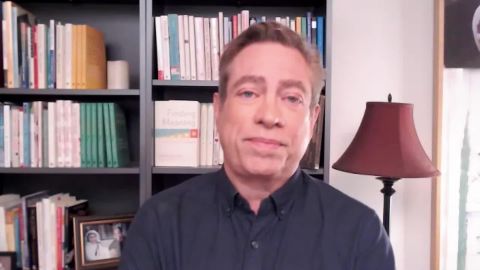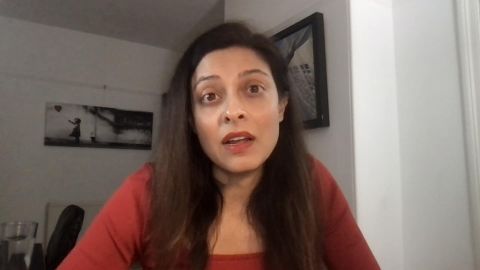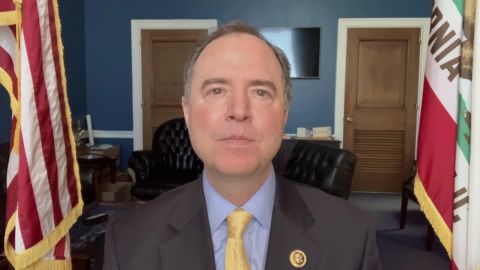Read Transcript EXPAND
CHRISTIANE AMANPOUR: Now, on the night before his inauguration, President Biden led a memorial for the 400,000 Americans who have died from coronavirus, to heal, we must remember, he said. And then on inauguration day, he paid his respects at the tomb of the unknown soldier at Arlington Cemetery. These are vital ceremonial gestures that embrace grief and highlight the importance of remembrance. As we know, Biden’s own life has been shaped by tragedy and personal loss. Now, David Kessler is an expert on death and grieving. And he’s also the author of “Finding Meaning: The Sixth Stage of Grief,” as he lays out now in conversation with our Michel Martin.
MICHEL MARTIN: Thanks, Christiane. David Kessler, it’s so good to see you. Thank you so much for joining us.
DAVID KESSLER, AUTHOR, “FINDING MEANING: THE SIXTH STAGE OF GRIEF”: Good to be with you again.
MARTIN: We are speaking at such a remarkable moment. I mean, a new president has been inaugurated but not without a great deal of struggle and even violence. And as we are speaking, you know, 400,000 people in the United States alone have died from this pandemic that we’ve been dealing with for months now. So, as we are just past the inauguration of Joseph Biden and Kamala Harris, I was just wondering what comes to mind for you?
KESSLER: Hope. I have a lot of hope and meaning for the future. It’s been such a dark night and it felt even darker and I pray that that saying, it’s always darkest before the dawn is what we’re ready for, and then Los Angeles, as which — as one of the epic centers. And it has been brutal to watch what’s happening to this country and touching so many lives.
MARTIN: One of the things that I think that stood out for many people as Joe Biden approached this inauguration is this was the first time that a national leader led us in mourning for all of the lives lost. I mean, it’s true that, you know, a number of religious leaders have gotten together and tried to do this, civic leaders have gotten together to do this, but this is the first time a national leader has gathered the country to mourn for lives lost due to this coronavirus pandemic. And it made me wonder what role do you think grief plays in Joe Biden’s life, and what role do you think it will play in how he intends to lead us?
KESSLER: Sure. Well, first of all, the 400,000 lives that have been lost, that grief has not only gone unattended but unacknowledged. And so, Joe Biden knows grief from early in his life with the death of his wife and his daughter and to the death of his son, Beau. And I thought it was brilliant the way one of the first things we heard Jill say, his wife, Dr. Jill, was that they know how to make a family whole and he knows how to make a country whole. And I always say this is such a grief-illiterate society. President Biden knows how to speak grief and knows how to speak healing.
MARTIN: Could you talk a little bit more about that? What does that mean and why do you say that?
KESSLER: I don’t think we know how to talk about grief. I don’t think we’ve known how to do many times what I say our great grandparents knew how to do, to just talk about that. One of the things that President Biden does is he knows how to bring the dead with us into the future, into the present. You know, grief doesn’t mean we get over it, we move on. We have to move forward in a way that honors the dead. And I think his talk is — it’s giving us permission to have these conversations. And we’re also learning grief, of course, the worse grief in the world is a loved one dying. It’s also the loss of a job. It’s also the loss of a business, of so many projects. So, we’re just learning how to talk about this.
MARTIN: Well, for those who don’t — who may not remember the full story, I mean, Joe Biden lost his wife and daughter and almost lost his two boys even before he was sworn into the Senate. In fact, he was sworn — in a car accident, it has to be said, and he was sworn into the Senate and there — the hospital bed are the two surviving boys. And of course, subsequently, his son, Beau, died of cancer, which was a terribly, you know, traumatic experience. What do you think he learned from that?
KESSLER: Well, it’s interesting, we’ve had those interactions that I got into this work because my mother was dying when there was a mass shooting in this country, the first mass shooting, which actually turned out to be one of his first orders of business after that loss of his daughter and his wife. So, he started his work in government, in grief through great obstacles. And I think we have to remember, he also was a single parent riding the train home every night just to be with his boys. and Beau and Hunter have gone through enormous grief themselves. And so, when he says they know how to put a family together and country back together and bring wholeness, it’s not a slogan. It is something he has had to do in his life. More than once.
MARTIN: And forgive me for pointing this out, and I hope it doesn’t cause you pain, the reality of it is that you and he also share the experience of losing a child. And I, again, I’m so sorry for that loss.
KESSLER: Yes. My younger son, David, died a few years ago. And, you know, I can remember talking to President Biden when he was vice president, and, you know, one of the things, when we go back to the degree of literacy, that he understands. I work with so many people online these days and, obviously, I hope to work with them person again, they get stuck in the grieving fully or want to deny it and go into the living. Joe’s superpower is he knows it’s a mixture of fully grieving and fully living. And so, when we talk about these deep losses we’ve had, he knows how to not let them take us down but to continue on. You know, I say just like him, I know my son who loved my work as a grief specialist would not want his death to constrict my work but rather expand it. And this president gets that. And he is all about, you know, we have a choice. We can go through something or grow through something. And he is going to make us do that.
MARTIN: To the degree that can, would you mind telling us a bit about what it was like when you connected with then-Vice President Biden? He called you?
KESSLER: Yes, the phone rang one day and a voice said, we have vice President Biden on the line wanting to talk to you. And I’ll tell you, he is a kind man. He speaks in we. He is very inclusive. He talked about the grief we share. And I think that’s who he is. He also was someone — he, you know, had read my work and said that he had been taught by his mother that if something means something to you, touches you, to reach out to that person. And there’s very something honorable about a man who quotes his mother often. You know, that she was such a wonderful woman who inspired him in so many ways. And I was very moved by that call. And I was honored to talk to him about his cherished wound around the death of his son, Beau Biden.
MARTIN: We’ve seen a lot of anger in recent years, months and weeks, but I want to go back to what we saw at the capitol just a few weeks ago, you know, as we are speaking now. This mob, you know, invading the capitol, trying to stop the counting of the votes and the confirmation of the presidential election. They were angry. You know, I’ve heard it said, you know, that the root of anger is fear. But — and you can say, well, these folks are fearful of, you know, changes in our lives. But, gee, you know, how are we supposed to feel about someone who are fearful of losing something they didn’t deserve to begin with, which is their white superiority? I mean, how are we supposed to deal with that?
KESSLER: Right. Well, certainly, those who invaded the capitol, they have to be held accountable. There’s no excuse for that. That’s not about understanding why they did it. There’s other people who have been fed such bad information that would never storm the capitol and just don’t understand what’s happening. They’re being told their fears, their problems are caused by that person, by that group. We have to connect with one another. You know, when you meet someone and you get to know them, you can understand they’re not your enemy but there are people in power who give us bad information to purposely throw that off and further their agenda. Versus the agenda of these United States.
MARTIN: So, going forward, you know, how do you think the country will be marked by this experience? And how do we as a country, as you kind of put it, find meaning in what has happened? I mean, I take it you feel that President Biden has what it takes as a leader but — and will be deeply useful in guiding us through it. So — but apart from him, you know, what else do you think? How do you think the country will be marked by this period and how should we make sense of it?
KESSLER: Well, that’s the part that I’m so glad he is there because we do know grief must be witnessed. And as he says so eloquently, we have to remember to heal. And that’s been true about our history of this country always. We have to remember to heal. This country needed a ritual. We’ve been starved for rituals with not being able to go to funerals or seeing loved ones. So, you know, I remember even there was talk about, well, should we cancel the inauguration? He got the importance of seeing a ritual and seeing that transfer of power wins, and that we can go through this and end up with posttraumatic stress, but President Biden understands posttraumatic growth is a possibility that we should walk together towards.
MARTIN: What can the rest of us do?
KESSLER: Well, we can talk about our differences. We can share. We cannot say, I don’t like what you saw so I’m walking the other way. But we can listen not to respond but to hear, to be curious about the other. And I think we’ve lost some of that in our country. And President Biden knows empathy and knows how to listen and knows how to listen to understand. And I think we see that in him and will continue to see it even more.
MARTIN: When you and I first spoke in March, there were just over 1,000 deaths in this country. And now, we’re over 400,000. And I just wonder, are we at a point where we’re numb, that we’re just accepting this?
KESSLER: It hope not. And when I saw the memorial President Biden stood and really talked with his vice president, Kamala Harris, about these are brothers, fathers, sisters, children, he is personalizing it. The moment of silence at the inauguration — by the way, the first national moment of silence we have had at 400,000 people, heartbreaking, overdue and so important.
MARTIN: I want to ask how you are. I mean, you are in — you’re in Los Angeles, which is now one of the epicenters of this crisis. I mean, a tremendous death toll there and a lot of economic pain as well and a lot of anger, you know, frankly, over, you know, all of that. I just wonder how are you doing? How are your neighbors doing? What are you learning from this?
KESSLER: It’s been enormously hard to be in the epicenter of the pain. I talk every day in online groups to people who have lost their loved ones to this terrible tragedy. There’s thousands and thousands of them that we meet throughout the week. I was in one of our largest hospitals here in Los Angeles just a few weeks ago. I had, luckily, a couple of stents put in my heart and doing well now. But seeing the doctors and the nurses, how weary they are and how in pain they are, and I’ve been doing lectures for hospitals around the country that their staffs have never dealt with these kinds of deaths. And it is beyond what we’ve comprehended in our past. And I think, you know, when I see that pain up close, I wish I could take that for anyone who’s not sure if they should wear a mask or if this is real, I wish they could spend the day with me and see this world that I’m in and see the pain.
MARTIN: What do you think the other side of this might be like? I mean, at some point, this will end. What do you think the other side of this is going to be like?
KESSLER: Well, that’s so important to keep in mind. As I’ve study meaning and finding meaning after great losses, what is so important to know is this pain will end. There will be an after this. The question is, what are we going to do after this? Are we going to be a better society? A kinder society? A more tolerant society? That’s my hope and my prayer, that our after this is even more peaceful and that we get the lessons.
MARTIN: David Kessler, thank you so much for talking with us today.
KESSLER: Thank you.
About This Episode EXPAND
Global health expert Devi Sridhar explains how President Biden can best implement a federal pandemic plan. NATO Secretary General Jens Stoltenberg expresses his hope to rebuild a transatlantic partnership under the Biden administration. Rep. Adam Schiff discusses future plans for the Democratic Party. Grief expert David Kessler reflects on the 400,000 American lives lost to COVID-19.
LEARN MORE



